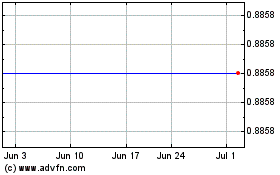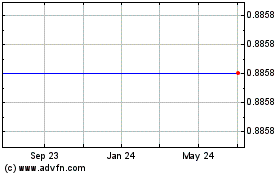Brexit Buffets Brits, Yen Boosts Japanese Among Ranks of Global Rich
November 22 2016 - 5:40AM
Dow Jones News
ZURICH—The British pound's plunge in value after the Brexit vote
triggered a steep slide in U.K. wealth, shrinking the number of
British millionaires in a dramatic example of how recent currency
gyrations have changed the ranks of the world's most wealthy
without alleviating inequality.
Credit Suisse, the Swiss bank, said on Tuesday that U.K.
households shed $1.5 trillion in wealth, based on its calculations
on data at the middle of the year compared with the same time a
year earlier.
A big factor behind the 10% drop was the weaker pound which
reduced the value of British assets when priced into dollars, the
bank said in latest global-wealth report.The U.K. lost about
one-sixth, or just over 400,000 of its millionaires.
The report is the seventh annual reading on international wealth
trends by the Swiss banking giant, which had 725 billion Swiss
francs ($719 billion) in assets under management at the end of the
third quarter.
The latest results are noteworthy because they show some early
fallout of the U.K.'s vote in June to leave the European Union, and
underscore the persistent gap between rich and poor across the
globe. They also highlight the central role fluctuating currencies
have played on household balance sheets.
"The hit from Brexit is pretty enormous," said Michael
O'Sullivan, Credit Suisse's Chief Investment Officer for
International Wealth Management. The pound lost about 15% of its
value against the dollar from mid-2015 to the middle of this
year.
China also experienced a drop in wealth, though not as
pronounced as Britain's. Credit Suisse attributed the country's
$680 billion decline to declines in Chinese stock prices in
addition to the yuan's weakness against the dollar.
While the wealthy in Britain and China were the chief losers in
the period Credit Suisse studied, the rich in Japan and the U.S.
were the big gainers.
The strong yen contributed to a nearly $4 trillion increase in
household wealth in Japan, with the buoyant dollar helping increase
U.S. wealth by $1.7 trillion.
Globally, total wealth inched higher by 1.4% to $256 trillion,
according to the Credit Suisse report. On a per-adult basis,
average wealth declined 0.1% to $52,800. It was the third-straight
year of broad stagnation after five years of strong growth
following the global financial crisis in 2008.
"It confirms the secular stagnation story," said Mr. O'Sullivan,
referring to idea that the world economy is in for a long period of
subpar growth.
Meanwhile, the richest of the rich accounted for more than half
of the world's wealth in 2016, extending a trend in place much of
the last 15 years, according to Credit Suisse.
Such concentration of wealth has shown signs of sparking a
political backlash around the world that has manifested itself in
the Brexit vote, the election of Donald Trump as U.S. president and
rise of nationalist parties in parts of Europe.
The top 1% of households saw their share of the wealth pie
increase to 51%, a slight increase from 2015 and up from around 45%
during the global financial crisis. Around 33 million adults had
wealth over one million dollars and accounted for over 45% of world
total, Credit Suisse said.
In contrast, roughly 3.5 billion adults, three-quarters of the
world's adult population, had assets under $10,000. They accounted
for just 2.4% of global wealth.
"It has been like this since the early 2000s," said Mr.
O'Sullivan, referring to the persistent gap between rich and poor.
"This explains a lot in terms of the tensions it provokes."
The data was compiled through June and includes financial assets
including stocks and bonds, nonfinancial assets—mainly property—and
subtracts debt.
Write to Brian Blackstone at brian.blackstone@wsj.com
(END) Dow Jones Newswires
November 22, 2016 05:25 ET (10:25 GMT)
Copyright (c) 2016 Dow Jones & Company, Inc.
Credit Suisse (NYSE:CS)
Historical Stock Chart
From Mar 2024 to Apr 2024

Credit Suisse (NYSE:CS)
Historical Stock Chart
From Apr 2023 to Apr 2024
